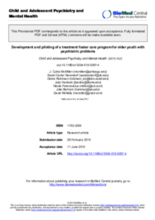Displaying 2191 - 2200 of 2509
After more than seven years of program implementation and research, the STRIVE program is coming to an end. To mark the end of this program, USAID and FHI 360 are hosting a closing event that will reflect on program learning.
Bethany Christian Services Global, LLC (Global) is recruiting an International Programs Director.
This paper reports on the development and piloting of a manualized treatment foster care program in the US designed to step down older youth with high psychiatric needs from residential programs to treatment foster care homes.
This article describes a program at a prison in California, USA that allows incarcerated mothers to live with their young children in a nursery in the prison.
The National Council for Adoption (NCFA) and the Joint Council on International Children's Services have teamed up to launch a new conference: Putting Family First, From Family Strengthening to Adoption. The conference will be held in Arlington, VA (metro D.C.) from June 22, 2015 to June 24, 2015.
A 20 year-old man from the United States, Matthew Lane Durham, has been convicted of sexually abusing children at a children’s home in Kiambu County, Kenya, where he was volunteering.
The MenCare Campaign in collaboration with the Clinton Foundation’s No Ceilings: The Full Participation Project and HeForShe: UN Women Solidarity Movement for Gender Equality, is hosting a launch of the world’s first-ever report on the State of the World’s Fathers – providing a global view of the state of men’s contribution to parenting and caregiving around the world.
The Faith to Action Initiative (F2A) is seeking a part-time Project Consultant.
This study replicated and extended previous research which identified the small proportion of highly productive foster parents who provide a disproportionate amount of care in the United States. This study used a nationally representative sample of foster families (N = 876) with a focus on willingness to foster, and actually fostering, children with special needs.
This article describes the experiences of Inuit children from Greenland who were removed from their families and taken to Denmark in the 1950s in an effort by the Danish government to re-educate them as “Little Danes” and to “modernize” Greenland.

